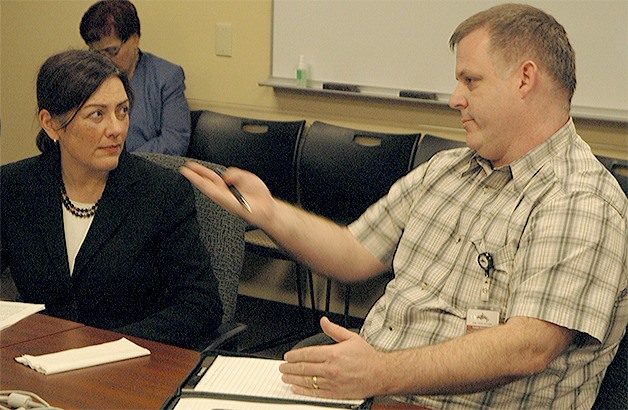TULALIP — It’s a Catch-22 common to Native American tribes in rural areas.
Telecommunications companies will say it’s not profitable for them to provide services, but when tribes try to create their own telecoms, the companies prevent them from doing so.
Travis Hill, operations manager for Salish Networks in Tulalip, was part of a roundtable of state tribal representatives who brought their concerns to U.S. Rep. Suzan DelBene Nov. 7.
“If a private company is getting money from the government, it should be inclusive in who it serves,” Hill said, recounting the struggles the Tulalip Tribes have had with Frontier Communications. “We’ve tried to work with Frontier, but they’ve dragged their feet. They’ve insisted there’s no business case for them to invest in this area. They’re literally not configured to allow us to order from them.”
Hill likewise described the registration process to start up one’s own telecom company as “challenging,” since the tribes have waited years to try and secure exemptions from state oversights, to which they’re already entitled as a sovereign nation.
“It’s not just us,” Hill said. “This is a national policy problem. Tulalip will ultimately make it work, but other tribes will need federal funding to get there.”
Joni Soriano, director of planning and development for the Sauk-Suiattle Tribe, not only faced the total loss of the tribe’s ability to communicate with the outside world in the wake of last year’s Oso slide, but also has to cope with a lack of cell phone towers and Internet access that make it almost impossible for her to do her job.
“If I’m applying for government grants for our tribe online, I either have to submit them at one in the morning or drive to the Safeway in Arlington for their Wi-Fi,” Soriano said.
Andrea Alexander of the Makah Tribe on the Northwest Olympic Peninsula, who serves as energy and telecommunications co-chair for the Affiliated Tribes of Northwest Indians, noted that internet and other telecommunications access is not just vital to a community education and economy, but also to its public safety. Several tribes that suffer from telecoms gaps are also in the middle of the tsunami zone, which makes it harder for them to use emergency networks that they need and are being asked to help pay for.
Tulalip native and state Sen. John McCoy echoed Hill’s characterization of telecom companies, based on his work with the Federal Communications Commission.
“Only the big telecoms get the big dollars from the government,” McCoy said. “The tribes can’t get to those dollars. Tulalip had proposed working with other partners to provide services to connect all the tribes north to Canada, but Wave said, ‘We own that territory, so you can’t provide services for it.'”
Alexander pointed out that only 10 tribes have been able to start up their own telecom companies, and agreed with DelBene’s assessment that the internet grew so fast that the FCC’s policies have yet to catch up.
“It’s not just a federal problem, but a government problem,” DelBene said. “We’re not good at investing in technology. It is part of our infrastructure now, and not just the kind that you can build and then replace thirty years down the line. You can’t just set it and forget it. Maintaining it is as important as getting it place to begin with.”
McCoy recalled the days when Marysville had broadband and Tulalip had dial-up, because GTE wouldn’t cross I-5.
“As long as the determining factor is profit, you’ll never get there,” McCoy said. “It always infuriates me when people say Indians should pull ourselves up by our bootstraps, but then put barriers up to prevent us from doing that.”
Hill added: “For billion-dollar telecom companies, the money they’d make out here is worth nothing to them, but for the tribes, that money could make a huge difference. And yet, everyone gets that money except for the tribes.”
When DelBene asked if there were any success stories for Native American tribes in telecommunications, McCoy pointed to the businesses that have flocked to Quil Ceda Village, while Soriano cited the Tulalip Data Services building in which they were conducting their roundtable.
“The staff here are paid living wages and allow Tulalip tribal members to do their online business at home, rather than driving fifty miles to do their work, like me,” Soriano said.







